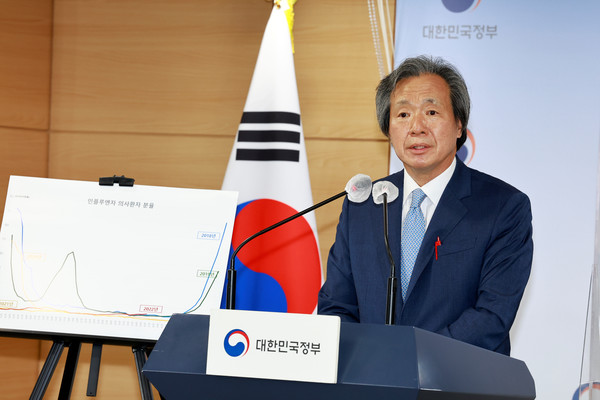Citizens can receive the Covid-19 and influenza vaccination simultaneously on each arm, a top quarantine advisor said.
"This is because the side effects are similar to receiving the two vaccines individually, and most of the people have already received a Covid-19 vaccine at least once," said Jung Ki-suck, head of the National Advisory Committee on Infectious Disease Crisis Response, during a press briefing on Wednesday.

Jung made such remarks as the number of flu cases, which had not been an issue since the advent of Covid-19 pandemic, is increasing again this year. The situation raises concerns that Covid-19 and the flu could spread at the same time in the autumn/winter season.
According to the Korea Disease Control and Prevention Agency (KDCA), 4.7 among 1,000 patients who visited the hospital from Aug. 23 to Sept. 3 showed influenza-like symptoms. The figure is the highest for the same seven-day period in the last five years.
"Now is the best time to prepare for the flu, and we need to be thoroughly prepared for not only Covid-19, but also a possible influenza pandemic," Jung said.
While there are concerns that it will be difficult to distinguish two diseases with similar symptoms, Jung explained that the typical symptoms of influenza and Covid-19 were different.
"Influenza differs from Covid-19 in that it suddenly shows unique symptoms such as fever, body aches, and headaches," Jung said. "However, not all influenza and Covid-19 cases show typical symptoms."
Jung stressed that patients must undergo a thorough examination for an accurate diagnosis.
"Rapid antigen testing is universally performed for both influenza and COVID-19, and a more accurate but time-consuming polymerase chain reaction (PCR) test can also detect influenza or Covid-19," he said.
During the briefing, Jung also explained that while a vaccine cannot perfectly prevent Covid-19 and influenza, vaccines are still important in terms of preventing disease as well as reducing severity and mortality and added that high-risk groups, including those with chronic diseases such as high blood pressure and diabetes, should receive the influenza vaccine.
"While some people have expressed worries about the nation's capability to detect and treat both viruses, there are more than 10,000 'one-stop medical institutions' that can provide diagnosis and treatment, which is about one in three local hospitals and clinics," Jung said. "If we include other respiratory treatment centers, there are more, and these institutions have the sufficient capacity and preparation to detect and treat both Covid-19 and influenza at the same time."
On Wednesday, Korea added 93,981 Covid-19 infections, including 314 cases from overseas, bringing the total caseload to 24,193,038, the KDCA said.
Wednesday's tally jumped by nearly 37,000 from 57,309 cases a day earlier following the four-day Chuseok holiday that ended Monday.
The nation also reported 60 more Covid-19 deaths, raising the death toll to 27,593. The fatality rate stood at 0.11 percent. The number of critically ill patients came to 507, down 40 from the previous day, the KDCA said.
According to the KDCA, about 44.67 million among 52 million Koreans have been fully vaccinated. In addition, about 33.57 million people had received their first booster shots, and 7.3 million had their second booster shots.

